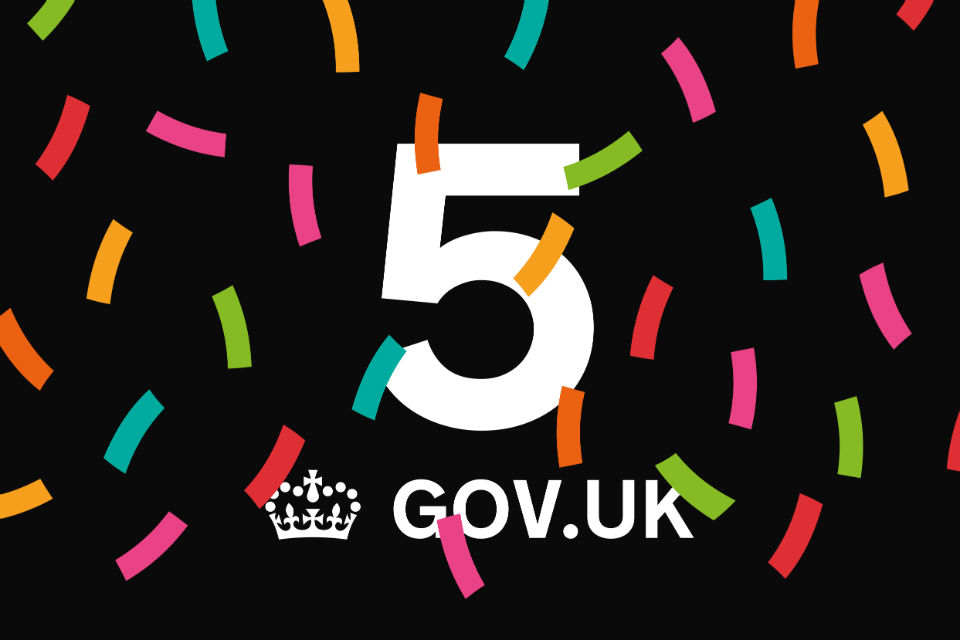
This week marks 5 years since the launch of GOV.UK.
GOV.UK is built around user needs. It is designed to make it simple and clear for people to interact with government online.
GOV.UK is also an asset to government. It is the channel through which government communicates what it’s doing, what it’s thinking, how it’s working. It has become a vital part of our national infrastructure.
Every week, 12 million visitors use GOV.UK to access services and information that affect many important aspects of their lives. Over 1.5 million people follow GOV.UK on Twitter.
The quality of a person’s experience on GOV.UK, and the ease with which they can find and do what they need, contributes to their perception of government.

Five years ago, GDS took nearly 2,000 government websites and turned them into a single publishing platform for government. Together with other departments and agencies, work began to remove content that nobody needed, and saved the taxpayer over £60 million.
GOV.UK's creation brought government together and created a highly trusted brand. The mission was to create a single domain for government, to make it the best place to find government services and information. Just over 4 billion visits later, I am proud that this is the GOV.UK we see today. It is a solid foundation: in 5 years, content has been consolidated and simplified, and services have been developed, so that they make sense for users.
This work has brought together an incredible community of content designers and publishers across government. The community had its big meet-up last week, #ConCon6. Some 240 colleagues from 56 departments and agencies came together to share experiences, learn from each other and build together.
It is right that we celebrate the successes of GOV.UK, but we should not rest on our laurels: there is still work to do. We must continue to simplify the complexity of government for users and transform public services. It is important that we ensure government has the tools, processes and data insights to manage and continually improve the structure and clarity of its services and information.
There are huge opportunities to do more with data. GOV.UK has access to a huge amount of information with enormous potential, including what people search for, what they’re confused by, and their feedback. We want GOV.UK to be a way for government to better understand the mood of the nation, to see what people need and understand what they are struggling to do. We want to be able to find out quickly through experimentation what will work for users and achieve government’s policy objectives.
All of this work contributes to creating a government that can continually adapt. As the Government Transformation Strategy says: we need to use digital to transform the relationship between citizen and state.
The successes of GOV.UK over the past 5 years demonstrate the benefits of transformation. Transformation is hard, it takes time, but it’s the only way and it has to happen across the Civil Service.
We are delivering 40 major government change programmes. We will introduce new digital services that will require organisational change and redesign. We anticipate that these will deliver £71.1 billion in benefits throughout their lifespans. For example, the NHS Procurement Transformation Programme is projected to save £600 million annually by increasing the buying power of NHS Trusts to get lower prices on clinical products.
 By 2020 we will have substantially delivered at least 89 digital services, which will change, for the better, the interaction between the government and those it interacts with - delivering precisely the sort of improved outcomes that are a fundamental pillar of our vision for a Brilliant Civil Service.
By 2020 we will have substantially delivered at least 89 digital services, which will change, for the better, the interaction between the government and those it interacts with - delivering precisely the sort of improved outcomes that are a fundamental pillar of our vision for a Brilliant Civil Service.
So, to all the teams in all the departments who have brought us to this point, thank you and congratulations. Know that you have my support for the vast and varied work currently underway to ensure that, in 20 years' time, the UK is still ahead.

1 comment
Comment by Neil posted on
John, I am in no doubt that gov.uk offers great advise to UK individuals and businesses alike, but you are absolutely right that we should not rest on our laurels.
There is an increasing amout of work across govt to understand 'megatrends' and it's very important that we embrace it and invest in it.
For example, the world has seen over the last few years the massive growth of social media, yet GOV.UK hasn't caught up yet, or to be blunt even heard the starting pistol if I'm being truly honest. I know that GOV.UK do tweet and have a great number of followers, but does the valuable information in the written format get across everything we need it to for UKs multicultural and diverse population? I truly don't think it does...
One of the many opportunities is YouTube, in as much as there's a number of reasons why almost 5 billion videos are watched on Youtube every single day by 30 million viewers every day- it's much simpler to understand than written text, digital or otherwise for the majority of the world's population, which is also why it translates to over 100 languages...
There are many great videos on Youtube from a number of civil service departments, HMRC are a great example. Recently they have launched a third tax credits short animated video which aims to educate their 5 million customers to explain what they need to do to manage them to keep overpayments to a minimum.
I'm not suggesting GOV.UK. becomes goverment's version of Youtube, but what I am saying is that it needs to understand the growing social media megatrend and get with the times by proactively promoting these valuable videos on GOV.UK. and on its twitter site to compliment the content on GOV.UK otherwise there's a massive risk we continue to rest on our laurels...